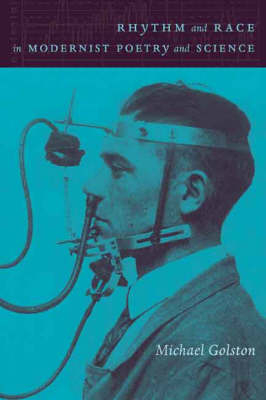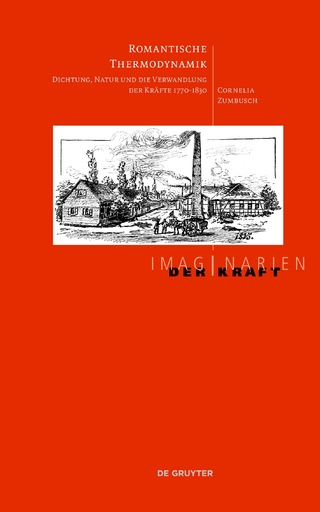
Rhythm and Race in Modernist Poetry and Science
Pound, Yeats, Williams, and Modern Sciences of Rhythm
Seiten
2007
Columbia University Press (Verlag)
978-0-231-14276-2 (ISBN)
Columbia University Press (Verlag)
978-0-231-14276-2 (ISBN)
- Lieferbar (Termin unbekannt)
- Versandkostenfrei innerhalb Deutschlands
- Auch auf Rechnung
- Verfügbarkeit in der Filiale vor Ort prüfen
- Artikel merken
In the half-century between 1890 and 1950, a variety of fields and disciplines, from musicology and literary studies to biology, psychology, genetics, and eugenics, expressed a profound interest in the subject of rhythm. This book examines psychological and physiological experiments that proved that races responded differently to rhythmic stimuli.
In the half-century between 1890 and 1950, a variety of fields and disciplines, from musicology and literary studies to biology, psychology, genetics, and eugenics, expressed a profound interest in the subject of rhythm. In this book, Michael Golston recovers much of the work done in this area and situates it in the society, politics, and culture of the Modernist period. He then filters selected Modernist poems through this archive to demonstrate that innovations in prosody, form, and subject matter are based on a largely forgotten ideology of rhythm and that beneath Modernist prosody is a science and an accompanying technology. In his analysis, Golston first examines psychological and physiological experiments that purportedly proved that races responded differently to rhythmic stimuli. He then demonstrates how poets like Ezra Pound, W. B. Yeats, Mina Loy, and William Carlos Williams either absorbed or echoed the information in these studies, using it to hone the innovative edge of Modernist practice and fundamentally alter the way poetry was written.
Golston performs close readings of canonical texts such as Pound's Cantos, Yeats's "Lake Isle of Innisfree," and William Carlos Williams's Paterson, and examines the role the sciences of rhythm played in racist discourses and fascist political thinking in the years leading up to World War II. Recovering obscure texts written in France, Germany, England, and America, Golston argues that "Rhythmics" was instrumental in generating an international modern art and should become a major consideration in our reading of reactionary avant-garde poetry.
In the half-century between 1890 and 1950, a variety of fields and disciplines, from musicology and literary studies to biology, psychology, genetics, and eugenics, expressed a profound interest in the subject of rhythm. In this book, Michael Golston recovers much of the work done in this area and situates it in the society, politics, and culture of the Modernist period. He then filters selected Modernist poems through this archive to demonstrate that innovations in prosody, form, and subject matter are based on a largely forgotten ideology of rhythm and that beneath Modernist prosody is a science and an accompanying technology. In his analysis, Golston first examines psychological and physiological experiments that purportedly proved that races responded differently to rhythmic stimuli. He then demonstrates how poets like Ezra Pound, W. B. Yeats, Mina Loy, and William Carlos Williams either absorbed or echoed the information in these studies, using it to hone the innovative edge of Modernist practice and fundamentally alter the way poetry was written.
Golston performs close readings of canonical texts such as Pound's Cantos, Yeats's "Lake Isle of Innisfree," and William Carlos Williams's Paterson, and examines the role the sciences of rhythm played in racist discourses and fascist political thinking in the years leading up to World War II. Recovering obscure texts written in France, Germany, England, and America, Golston argues that "Rhythmics" was instrumental in generating an international modern art and should become a major consideration in our reading of reactionary avant-garde poetry.
Michael Golston received his bachelor's degree from the University of New Mexico, his master's degree from the University of California, Berekeley, and his Ph.D. from Stanford University. He currently lives in New York City, where he teaches twentieth-century poetry and poetics at Columbia University.
List of Illustrations Acknowledgments Introduction: Phonoscopic Modernism 1. Pulsanda Tellus: Ezra Pound's Absolutist Rhythms 2. Double Registrations in the River of Blood 3. Machining Convictions: W. B. Yeats's Sanguineous Rhythms 4. Singing the Crisis Itself 5. Williams's Measured Interventions Notes Bibliography Index
| Erscheint lt. Verlag | 21.12.2007 |
|---|---|
| Zusatzinfo | 17 illustrations |
| Verlagsort | New York |
| Sprache | englisch |
| Maße | 152 x 229 mm |
| Themenwelt | Geisteswissenschaften ► Sprach- / Literaturwissenschaft ► Anglistik / Amerikanistik |
| Geisteswissenschaften ► Sprach- / Literaturwissenschaft ► Literaturgeschichte | |
| Geisteswissenschaften ► Sprach- / Literaturwissenschaft ► Literaturwissenschaft | |
| ISBN-10 | 0-231-14276-5 / 0231142765 |
| ISBN-13 | 978-0-231-14276-2 / 9780231142762 |
| Zustand | Neuware |
| Haben Sie eine Frage zum Produkt? |
Mehr entdecken
aus dem Bereich
aus dem Bereich
Dichtung, Natur und die Verwandlung der Kräfte 1770-1830
Buch | Hardcover (2023)
De Gruyter (Verlag)
59,00 €


